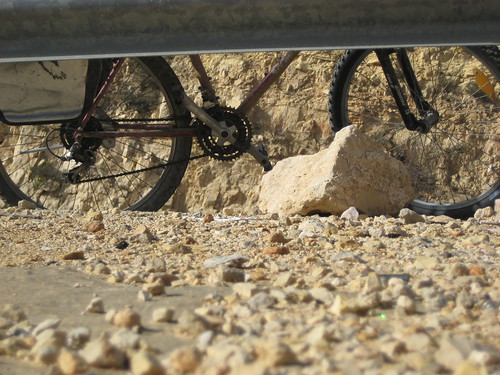
Riding a bike through the west bank is a certain confluence of insanity and privilege that is as hard to justify as it is unlikely to occur. But it did occur, so now I'm going to justify it.
Well, actually I'm not. Screw justification. I'm alive and nobody's blown the world up just yet, so I do what I do and try to actively help other folks in the process. But I do think there's a lot to be learned about militarized zones, identity-controlled existences, and the politics of space within the little soap bubble that is me biking from Jerusalem to Nablus. I will also boldly say that it was one of the more pleasurable little adventures I've been on.
First off: Google maps has deigned not to give names to the city streets within the Palestinan Territories. The interesting thing is that we've grown so used to using technology that this is strange. Next time I come I'll probably be like 'what? no street view? Pah.' Being the seat-of-the-pants type I never thought about bringing a map, I just set off in the direction of Ramallah with a list of cities to head for and major roads connecting them. I'd figure I'd ask people along the way. Now, it's Saturday, the Sabbath, and I'm wandering around the rainy, empty-of-cars-streets of Jerusalem thinking of going up to the nearest culturally-complicated (in appearance) Jewish fellow (his felt hat in a trim little raincoat all of its own) and asking "scuse me, do you know the way to the west bank?" There's one problem for you: how to ask for directions when you don't want to tell someone where you're trying to go. Unintentional freeway riding ensues.
Next, there's the troubling little habit of routes sometimes inexplicably dead-ending into walled-off refugee camps that are apocalyptic in appearance. This is officially the only bike tour I've been on where certain routes seem direct until, looking at a satilite image, you notice the shadow being cast by a 20-foot 5 mile concrete barrier, and you have to figure out which side of it you're supposed to be on to continue.
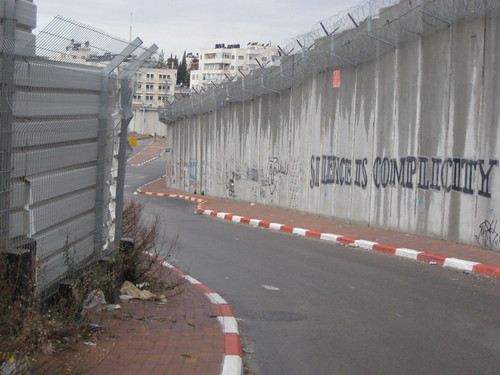
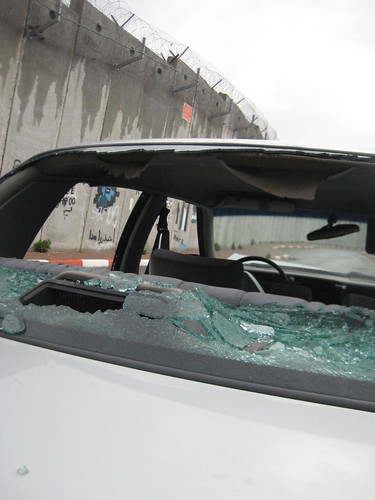
Now, remember how 15 miles from here there are lush gardens where 20-somethings lounge on a hilly paradise tending vegetables, hiking trails and watching the sunset? This is the same country. The people are just as kind to a passing biker, but now when I ask for directions I speak arabic with a beautiful young woman in bright clothes and a hijab who looks as out of place on a trash-strewn sidewalk with military jeeps and broken concrete as Marilyn Manson would look in a preschool. I didn't take many pictures as I crossed into the west bank, mostly because I was incredibly intimidated, but it was pretty damn end-of-the-worldy.
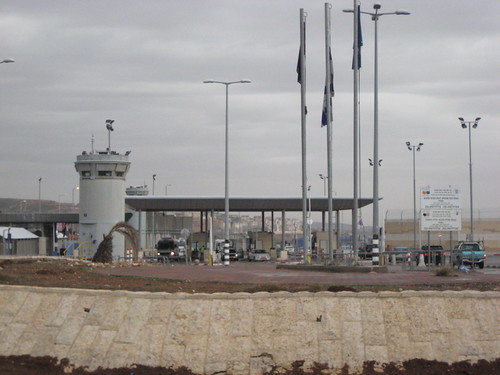
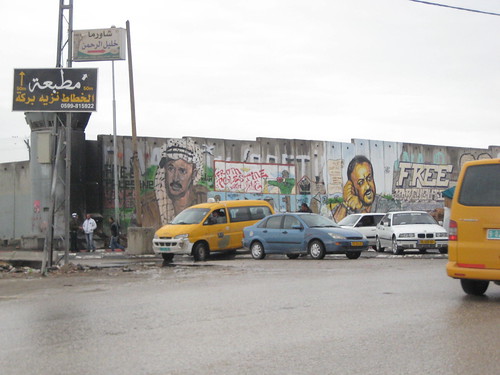
It's still raining at this point, just FYI.
Now comes the fun part where you pass the checkpoint (which was actionless going in, it's going out where they getcha) and start asking directions to the next town. Sometimes it's quite easy: you wave at a cab in traffic to roll down his window, and in very broken arabic ask whether this road leads to say, Jaba. At the time I didn't realize it, but it's a modern miracle everyone understood me, because pretty much every word in the sentence "Does this road go to jaba?" is different one country over in Egypt, where I last studied Arabic. Other times it's more circuitous, such as when, still raining, I passed the green line into the outskirts of Ramallah and was admiring the trash, cats, and other third world conditions (oh and I was lost) when I was waved over to an auto shop by a gaggle of mechanics. I say hi, exchange pleasantries, and then an exchange almost exactly like this goes down (again in arabic):
"So is this the road I should take to Jaba?"
"Do you want to drink tea with us?"
"Oh, thanks, but no, I have a long way to bike"
"Where are you going?"
"Nablus"
"Oh god, by bike?"
"Yeah, crazy huh? Is this the road I should take?"
"Are you married"
"Uh?"
"Do you want to have sex?"
"Um. Jaba?"
So there's that. It's still raining. A couple good cheers from passerby and attempting to help un-stick a high-centered car later I found my way and started into some rolling hills on what I knew was the right highway. The rain cleared up and I got really, really happy. Everything was thrumming along well, it was beautiful and I had some fruit (but no real breakfast (Sabbath in Israel= closed everything)). I started noticing the following things:
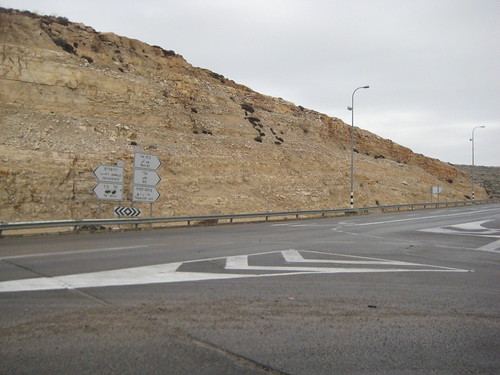
Palestine pretty much looks like southern Utah, the crusty unremarkable bits that we all know so well. Beautiful but subdued.
Settlers scratch out signs in Arabic or cover them with stickers. They also put up lots of wheatpastes in Hebrew.
Middle Eastern drivers rock, I've never felt safer on the side of a small freeway.
Though the day was beautiful and I had plenty of water after a few hours I started running out of steam and thinking of lunch. There I encountered another problem unique to the region: How to best ascertain whether I'm approaching and patronizing a nice downtrodden Palestinian village or a bastion of western manifest destiny and exploitation: A notorious settlement (that, for all I knew, only just that week stole the water rights from the surrounding area)?
Being nervous about betraying my politics I passed a number of lunch spots (as it seems to be the style around here to keep the highway far from the towns with long exits into them) in search of a definitely arab one. I was flagging, but resorted to a pretty fantastic emergency measure: After resting and drinking water I spied a double-long semi pulling out of a by-road. I did a little wave to the driver then sprinted, catching up in a marvelously well-timed maneuver and grabbing onto a sinch-strap on the back of the truck. Thus I skitched a truck along around 8 kilometers of rural highway, weaving in-and out of the rumble strips to the side of the road. I had a car of young men pass me and my host vehicle cheering me on like it was pretty much the coolest thing they'd ever seen, and I admit I felt good about the situation myself. I hung on until my arm gave out and then resumed my overloaded mountain bike progress.
I had lunch at a town called Turmisseyh, where I stopped at a hardware shop and asked about lunch opportunities. There I met a nice guy named Mustafa, who said, "Oh, you're an American? We're all Americans!"
"Uh-huh," I said, appreciating the gesture of acceptance.
"No really" He said, and pulled out an American passport.
"Oh. Wow. You're serious!"
Apparently the village consists of about 8000 people, 6000 of whom live in America. Makes your head spin, coming to a place known to restrict movement more than almost anywhere else on earth right now and make small talk about the details of say, the Chicago rail system.
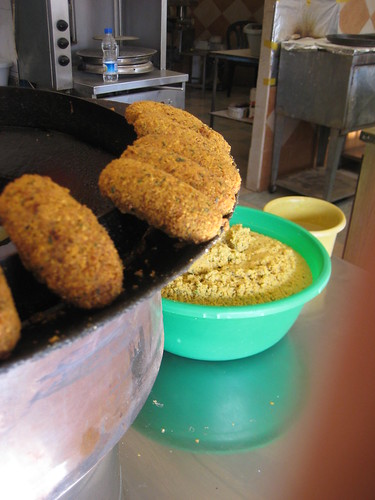
After yummies a long religious lecture "All the other religions were created by man! Who can believe the word of man? Islam is the word of god!" and the discovery of Kaki (we call 'em persimmons and they're delicious) I headed out again.
Being back in Arab country, especially roads less traveled, I'm reminded of the fever pitch of hospitality and curiosity about foreigners. In smaller towns every single person wishes to talk to you and befriend you, you'll literally turn down 3 invitations to lunch as you pedal by. As I got closer to Nablus this started to fade slightly, but even still you could make fast friends with ANYONE on the street. Nablus, it turns out, is a big deal. It's said to be the biggest city in Palestine, though I would have thought that distinction belongs to Ramallah. Certainly the first traffic lights I saw since Jerusalem popped up well inside the city itself. But first there's the infamous checkpoint. Because Nablus is a bit of a west-bank problem child. Due to the two biggest refugee camps bordering the city and the ancient heart of the city itself, Nablus but up the strongest fight during the second intifada in 2002. It was here, in Balata camp, that Israel employed the 'through walls' technique which I believe American troops used in Iraq. The camp was so close knit and tight that IDF troops simply went in one house and blew their way through all the rest of them, stunning and killing as they went and never exposing themselves to outside enemy fire. Lovely lovely. Anyway, as a result of this stubbornness Nablus has had a blockade around it since that point, which in 2009 was relaxed into a checkpoint.
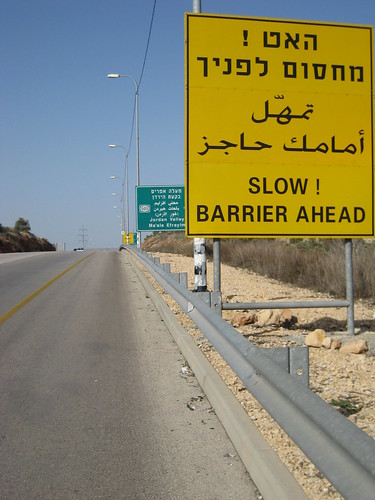
But still I rolled up to some rather incredulous IDF kids (no, really, they're kids. I'm talking copious pimples).
"Shalom, Hi!"
"What are you doing here?"
"Um, biking. I biked here from Jerusalem."
"Today!?!"
"Cool huh?"
"Why?"
"No idea. It's just kind of what I do."
"But why here? You know it's very dangerous, right?"
"Oh sure, I'm aware, but I'm willing to take that risk. Ya see, I speak a bit of arabic and I wanted to practice it."
This conversation ended with them informing me that nobody was allowed through on foot. I decided not to enter into the rather interesting philosophical debate about the exact set of parameters that makes a vehicle a vehicle and instead said "oh well, can I go hop in a truck?" They assured me that'd be fine, but after my passport was seen to be "in order" (which is funny, as I don't have an entry stamp to Israel in it) they waved me through. And muddy, tired, happy, and unscathed I made it into Nablus, which exceeded my initial expectations and continues to make me happy and blow my mind. But that's another story.
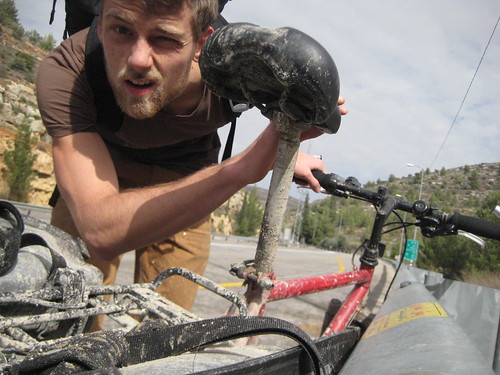
Saturday, February 5, 2011
Slow! Barrier Ahead!
Labels:
absurd,
bike madness,
bike tour,
global inequality,
Middle East,
palestine,
west bank
Subscribe to:
Post Comments (Atom)



























1 comment:
I'm happy you made it and loving the updates. I love you and your approach to living life. <3
Post a Comment